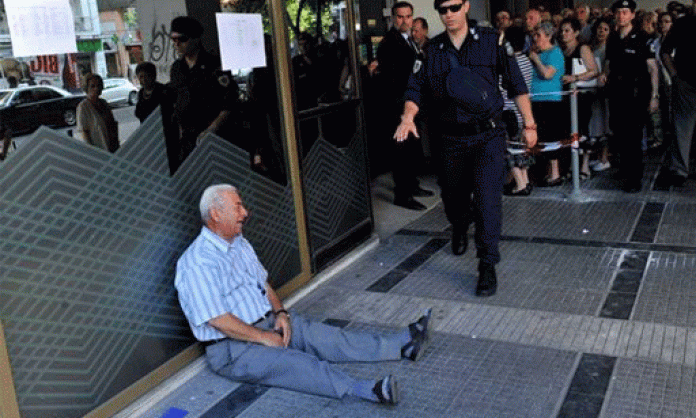The troika of the International Monetary Fund, the European Commission and the European Central Bank, along with their partners in the Greek ruling class, have wreaked havoc in the southern European nation.
A social crisis, the likes of which has not been seen since the war and depression era, has decimated the working class. More than one-third of the population is now in poverty. The unemployment rate is above 25 percent. Millions have been stripped of health insurance and the public system is in disarray. The OECD’s 2014 Society at a glance country note reported:
“Total household income in Greece dropped by 1/3 between 2007 and 2012, with average losses of some 4,400 euros per person [per year] …
“The share of people saying that they cannot afford food has doubled … a higher level than in some emerging economies with much lower per-capita income, such as China or Brazil.”
This week a picture of an old man began circulating throughout the country. He is broken down and weeping outside a bank, his plight typical and now emblematic of the human collateral damage.
Above the vultures are circling. Always searching for profits, some analysts are looking on with glee. They are blind to a fallen man but rub their hands at falling equity prices. They are encouraging investors to cash in – a “buy low, sell high” strategy.
There are now computer programs and advanced statistical tools (Fibonacci retracements, sloping trend channels, etc.) with which investors can pick and choose where to buy and sell, based solely on profit potential, or just leave it to the computer to do the dirty work, with scant regard for the human consequences.
Using such methods, Ric Spooner from CMC Markets wrote at Business Spectator on 2 July how “the Greek crisis has created a value opportunity in Europe”.
Such strategies have rightfully earned the name “vulture capitalism”: go in, destroy the joint, pick up the remaining pieces at bargain basement prices and make millions afterwards.
Cash in on the misery.
Private equity firms have wreaked havoc in this way for decades. One employee of a shut down US trucking company explained to Talk of the Nation in 2012: “There was a design and a method in place to leverage us out, take the asset, gut the company, sell everything off, and then a very small handful of people became very wealthy”.
The human devastation left behind was of no consequence.
But in truth, vulture capitalism is no anomaly; it is just one aspect of business as usual. Capitalism is a system that it is driven by the ruthless pursuit of profit. The competition that leads to innovation and “success” pushes the ruling class to ever more barbaric methods.
It is a system based on the exploitation of the people who actually produce the profits, the working class; a system of wage theft in which CEOs pocket obscene levels of remuneration.
Profits increasingly are funnelled into tax havens, while workers are told that governments can no longer afford to provide healthcare, education, housing and welfare, and that bosses cannot afford penalty rates or pay rises.
It is a system that recognises only opportunity in misery and tragedy – whether it’s the crisis in Greece, famines and natural disasters or war.
It’s a system based on the theft of Indigenous lands and genocide of the peoples, to profit from the minerals and fuel beneath their surface.
It is a system that hurtles towards catastrophic ecological destruction to stoke the profits of Big Oil and the warmongers.
It is a system that dispenses with democracy as soon as it threatens to place a brake on the accumulation process.
Today, the vast wealth created by the workers of the world is firmly in the hands of the ruling classes. They are determined, no matter what the cost, to hold onto their trillions.
We need to take it back – not a bit of it or some of it. All of it.
To wrest this wealth from their hands, it will take a working class that is organised and determined, with a project of ending capitalism once and for all.
The brave stand by the Greek working class could be a crucial step in this direction.











